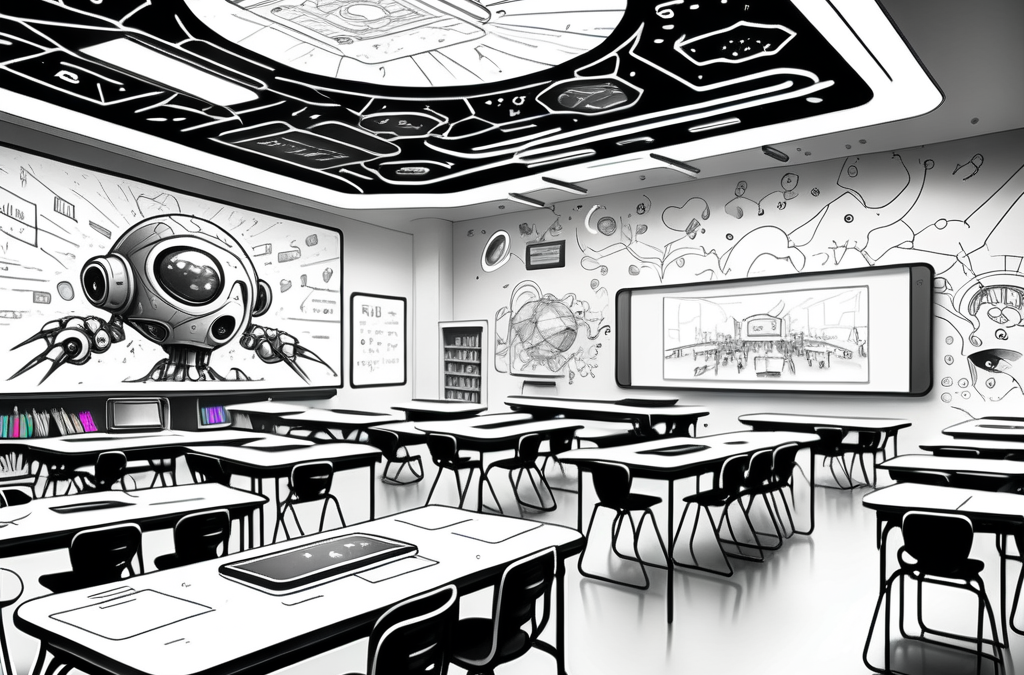Imagine a world where machines not only perform tasks but also enhance our thinking capabilities. This world is becoming a reality, with Artificial Intelligence (AI) rapidly transforming how we process information, make decisions, and tap into our creativity. AI is not just a tool; it’s a powerful ally that can help us navigate complex challenges and explore new ideas.
The Dawn of a New Thinking Era
Just a few years ago, smartphones amazed us with their ability to provide information. Fast forward to today, and we have AI assistants that can write essays, create stunning artwork, and even make predictions. This marks the beginning of a new era where AI acts as a super-smart companion that amplifies our cognitive abilities.
- AI’s Transformation: From simple tasks to complex problem-solving, AI is reshaping our approach to learning, creativity, and communication.
- Essential Questions: Is AI making us smarter, or are we becoming overly reliant on it? How can we harness its capabilities while preserving our unique human touch?
In this article, we will explore AI’s profound impact on human thinking and its role as a catalyst for change.
Unpacking the Impact of AI on Human Thinking
Historically, humans have used tools to sharpen our thinking, from ancient abacuses to modern calculators. Now, AI feels like strapping a rocket to our minds.
- Enhanced Problem-Solving: Consider an AI assistant that analyzes vast datasets to offer solutions you might never consider. This collaborative approach is changing the way we tackle challenges.
- Everyday Applications: AI is already present in our lives—predicting the next word while texting or suggesting what to watch next on streaming services.
However, while AI enhances our capabilities, it’s vital to balance our reliance on it with the need to exercise our critical thinking skills.
Decision Making 2.0: The AI Advantage
Imagine having a super-smart friend who’s always ready to help you make choices. AI is becoming that friend, revolutionizing how we make decisions.
- Personalized Recommendations: From Netflix to shopping apps, AI analyzes past behaviors to recommend what you might enjoy next.
- Critical Applications: In education, AI identifies students needing extra help. In healthcare, it assists doctors in diagnosing illnesses more accurately.
Yet, this brings challenges. We must remember that AI is a tool meant to assist us, not to replace our own judgment. Potential drawbacks include:
- Overreliance on AI for decisions.
- Risks of biased or incomplete information leading to unfair outcomes.
As we look ahead, AI’s role in decision-making could tackle significant global challenges. But human creativity and empathy will always be essential.
The AI-Powered Classroom: Personalized Learning for All
Imagine walking into a classroom where every lesson is tailored just for you. AI is transforming education, making learning more personalized and engaging.
- Tailored Learning Experiences: AI systems assess strengths and weaknesses, adapting lessons to individual learning styles.
- Interactive Learning: With AI simulations, students engage with complex topics in fun, interactive ways—like running their virtual ecosystems.
AI technologies are already breaking down barriers in education, offering support for students with disabilities through real-time captioning and speech recognition.
While AI is a powerful tool for enhancing learning, it will not replace teachers. It enriches the educational experience, encouraging innovative thinking.
AI: The Ultimate Creative Catalyst
Imagine a world where machines create art and music, pushing the boundaries of human creativity. AI is becoming an essential player in the creative realm.
- Art and Design: AI programs can paint stunning pictures and generate unique designs.
- Music Composition: AI analyzes countless songs to create new melodies that resonate with listeners.
As writers collaborate with AI, they can brainstorm ideas and refine their works, benefiting from a creative partner that never tires. Yet, questions arise about originality and copyright.
The future will see more collaborations between humans and AI in various creative sectors, enhancing the creative process rather than replacing it.
The Future of Critical Thinking: Human-AI Collaboration
Picture a world where AI elevates our critical thinking capabilities. AI tools allow us to analyze vast amounts of information quickly, revealing patterns and insights.
- Boosting Decision-Making: While AI excels at processing data, we must ask the right questions and interpret the results effectively.
- Developing Essential Skills: Learning to collaborate with AI requires honing skills like insightful questioning, information evaluation, and creative problem-solving.
Schools are already adapting to this landscape by teaching students to use AI responsibly and emphasizing adaptability.
Maintaining our critical thinking abilities is essential as we navigate potential biases and errors in AI systems.
The AI Effect: How AI is Influencing Our Thoughts
AI is reshaping our communication. Features like autocorrect and suggested replies enhance conversations, but they also risk diminishing our original thoughts.
- Navigating Misinformation: As AI-generated content becomes more prevalent, critical thinking skills are crucial. We must learn to discern fact from fiction in an era of fake news.
AI can simplify complex topics, making learning more accessible. To thrive in this environment, we should cultivate uniquely human qualities like creativity, emotional intelligence, and critical thinking.
Embracing the AI Transformation in Thinking
As we conclude our exploration, it’s clear that AI is revolutionizing how we think. AI enhances decision-making, personalizes education, and ignites creativity. However, it’s crucial to balance these advantages with our unique human perspectives.
- Collaborative Future: We are not merely ceding our thinking to machines; we are learning to work alongside them. AI personalizes our educational experiences while amplifying our creative powers.
The future of thinking lies in our hands. By embracing AI as a tool while valuing human thought, we can pioneer an extraordinary path ahead. The most exciting innovations will emerge when human creativity meets artificial intelligence, leading us into a future filled with endless possibilities.


